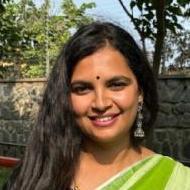
Peenya, Bangalore, India - 560058.
Verified 7 yrs of Exp
Details verified of Ranjitha P✕
 Identity
Identity
 Education
Education
Know how UrbanPro verifies Tutor details
Identity is verified based on matching the details uploaded by the Tutor with government databases.
Tamil Proficient
Kannada Proficient
English Proficient
Malayalam Basic
Hindi Basic
Sanskrit Basic
![]() BCU 2021
BCU 2021
MSc Biotechnology
Peenya, Bangalore, India - 560058
![]() ID Verified
ID Verified
![]() Education Verified
Education Verified
![]() Phone Verified
Phone Verified
![]() Email Verified
Email Verified
Report this Profile
Is this listing inaccurate or duplicate? Any other problem?
Please tell us about the problem and we will fix it.
Class Location
![]() Online Classes (Video Call via UrbanPro LIVE)
Online Classes (Video Call via UrbanPro LIVE)
![]() Student's Home
Student's Home
![]() Tutor's Home
Tutor's Home
Years of Experience in Class I-V Tuition
7
Fees
₹ 450.0 per hour
Board
State, CBSE, ICSE, Cambridge Assessment International Education (CAIE)
Subjects taught
English, Computer Science, Computers, Social studies, Social Science, Science, EVS
Taught in School or College
No
Teaching Experience in detail in Class I-V Tuition
I am a corporate professional with a strong foundation in Biology, Chemistry, and Biotechnology, and over six years of prior teaching experience. What began as a profession has evolved into a true passion for education. Teaching brings me immense fulfillment, especially when I connect with students by understanding their individual learning phases, styles, and needs. I take pride in helping them build confidence, achieve top academic results, and grow holistically—both intellectually and personally.
Class Location
![]() Online Classes (Video Call via UrbanPro LIVE)
Online Classes (Video Call via UrbanPro LIVE)
![]() Student's Home
Student's Home
![]() Tutor's Home
Tutor's Home
Years of Experience in Spoken English classes
7
Age groups catered to
Below 10 yrs, 10 yrs to 15 yrs
Levels of Spoken English I teach
Advanced, Basic
Lived or Worked in English Speaking Country
No
Exams Attended
IELTS
Awards and Recognition
No
Certification
None
Profession
Working Professional
Language of instruction offered
Tamil to English, Kannada to English, English to English
Curriculum Expertise
ICSE/ISC, CBSE, State
Citizen of English Speaking Country
No
Class strength catered to
One on one/ Private Tutions
Teaching done in
English Grammar, Basic Spoken English, Vocabulary
Teaching at
Home
Upcoming Live Classes
1. Which school boards of Class 1-5 do you teach for?
State, CBSE, ICSE and others
2. Have you ever taught in any School or College?
No
3. Which classes do you teach?
I teach Class I-V Tuition and Spoken English Classes.
4. Do you provide a demo class?
Yes, I provide a free demo class.
5. How many years of experience do you have?
I have been teaching for 7 years.
Answered on 17/06/2025 Learn 11th and 12th Biology, 8th,9th and10th Biology
The cell cycle is the process by which a cell grows and then divides to form two new cells. You can think of it like a school project: first, you prepare everything, and then you present or submit it. In the same way, the cell cycle has two main parts i.e interphase and M phase.
During interphase, the cell is not dividing yet. It's just getting ready. Interphase has three stages:
~First comes the G₁ phase. This is when the cell grows in size, makes proteins, and gets stronger — just like how we prepare our tools and materials before starting a project.
~Then comes the S phase. Here, the cell copies all of its DNA. Imagine you’re making two notebooks from one — the cell is making a second copy of its genetic information so both new cells will have the same set.
~After that is the G₂ phase. Now the cell checks everything — is the DNA copied properly? Is it ready to divide? If everything looks good, it moves to the next phase.
Then comes the M phase, which is where the actual cell division happens. This is called mitosis, and it happens in four main steps:
~In prophase, the DNA becomes visible as X-shaped chromosomes, and the covering of the nucleus breaks down. Think of it like opening a package so the contents can be shared.
~In metaphase, the chromosomes line up in the middle of the cell. It’s like soldiers standing in a straight line for inspection.
~In anaphase, the chromosomes split and move to opposite sides of the cell. It’s like dividing your books equally into two bags.
~In telophase, the cell starts forming two new nuclei on each side, and the chromosomes go back to their relaxed form.
Finally, the cell splits completely into two cells. Each new cell is just like the original one — with the same DNA and ready to live its life.
Hope this answer helps you, dear. All the best:)
Class Location
![]() Online Classes (Video Call via UrbanPro LIVE)
Online Classes (Video Call via UrbanPro LIVE)
![]() Student's Home
Student's Home
![]() Tutor's Home
Tutor's Home
Years of Experience in Class I-V Tuition
7
Fees
₹ 450.0 per hour
Board
State, CBSE, ICSE, Cambridge Assessment International Education (CAIE)
Subjects taught
English, Computer Science, Computers, Social studies, Social Science, Science, EVS
Taught in School or College
No
Teaching Experience in detail in Class I-V Tuition
I am a corporate professional with a strong foundation in Biology, Chemistry, and Biotechnology, and over six years of prior teaching experience. What began as a profession has evolved into a true passion for education. Teaching brings me immense fulfillment, especially when I connect with students by understanding their individual learning phases, styles, and needs. I take pride in helping them build confidence, achieve top academic results, and grow holistically—both intellectually and personally.
Class Location
![]() Online Classes (Video Call via UrbanPro LIVE)
Online Classes (Video Call via UrbanPro LIVE)
![]() Student's Home
Student's Home
![]() Tutor's Home
Tutor's Home
Years of Experience in Spoken English classes
7
Age groups catered to
Below 10 yrs, 10 yrs to 15 yrs
Levels of Spoken English I teach
Advanced, Basic
Lived or Worked in English Speaking Country
No
Exams Attended
IELTS
Awards and Recognition
No
Certification
None
Profession
Working Professional
Language of instruction offered
Tamil to English, Kannada to English, English to English
Curriculum Expertise
ICSE/ISC, CBSE, State
Citizen of English Speaking Country
No
Class strength catered to
One on one/ Private Tutions
Teaching done in
English Grammar, Basic Spoken English, Vocabulary
Teaching at
Home
Answered on 17/06/2025 Learn 11th and 12th Biology, 8th,9th and10th Biology
The cell cycle is the process by which a cell grows and then divides to form two new cells. You can think of it like a school project: first, you prepare everything, and then you present or submit it. In the same way, the cell cycle has two main parts i.e interphase and M phase.
During interphase, the cell is not dividing yet. It's just getting ready. Interphase has three stages:
~First comes the G₁ phase. This is when the cell grows in size, makes proteins, and gets stronger — just like how we prepare our tools and materials before starting a project.
~Then comes the S phase. Here, the cell copies all of its DNA. Imagine you’re making two notebooks from one — the cell is making a second copy of its genetic information so both new cells will have the same set.
~After that is the G₂ phase. Now the cell checks everything — is the DNA copied properly? Is it ready to divide? If everything looks good, it moves to the next phase.
Then comes the M phase, which is where the actual cell division happens. This is called mitosis, and it happens in four main steps:
~In prophase, the DNA becomes visible as X-shaped chromosomes, and the covering of the nucleus breaks down. Think of it like opening a package so the contents can be shared.
~In metaphase, the chromosomes line up in the middle of the cell. It’s like soldiers standing in a straight line for inspection.
~In anaphase, the chromosomes split and move to opposite sides of the cell. It’s like dividing your books equally into two bags.
~In telophase, the cell starts forming two new nuclei on each side, and the chromosomes go back to their relaxed form.
Finally, the cell splits completely into two cells. Each new cell is just like the original one — with the same DNA and ready to live its life.
Hope this answer helps you, dear. All the best:)

Share this Profile
Also have a look at
Reply to 's review
Enter your reply*
Your reply has been successfully submitted.
Certified
The Certified badge indicates that the Tutor has received good amount of positive feedback from Students.